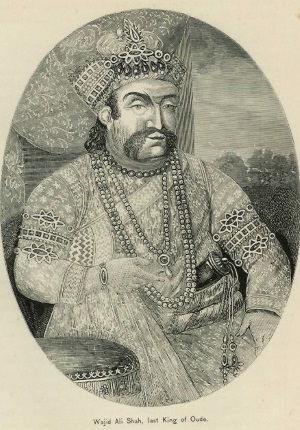Book Excerpt: The Last King in India: Wajid Ali Shah
 What can we conclude from the king’s lifelong struggles against British officialdom? What often seemed like perverse behaviour on Wajid ‘Ali Shah’s part can also be interpreted as the actions of a man who is resigned to his fate but is not going to go down quietly. The more he was criticised for his extravagance, the more he spent. The humiliation of becoming financially dependent on the British undoubtedly drove many of his actions, particularly when threats that he would not be bailed out over his debts were never implemented. Government censure of the way he treated his wives and children led to him severing almost all relations with them. Stripping him of his Awadh kingdom resulted in the creation of a new, smaller kingdom at Garden Reach.
What can we conclude from the king’s lifelong struggles against British officialdom? What often seemed like perverse behaviour on Wajid ‘Ali Shah’s part can also be interpreted as the actions of a man who is resigned to his fate but is not going to go down quietly. The more he was criticised for his extravagance, the more he spent. The humiliation of becoming financially dependent on the British undoubtedly drove many of his actions, particularly when threats that he would not be bailed out over his debts were never implemented. Government censure of the way he treated his wives and children led to him severing almost all relations with them. Stripping him of his Awadh kingdom resulted in the creation of a new, smaller kingdom at Garden Reach.
As for his sons, clearly many of them realised that they would have to make their own way in the world. Not only would there be no more government stipends, but their father’s extravagance meant that there was nothing to inherit either. There was no landed property left, not even their childhood homes. Prince Afsar-ul Mulk had made the best of an unpromising start and had been rewarded with the appointment as Sheriff of Calcutta, followed by executive posts in which he could influence, however slightly, political events. He preferred to work within the system of British India rather than remaining stubbornly outside it, as his father had done.
Because Awadh was the last kingdom to be annexed by the British, the question of deposing further Indian rulers did not arise again, at least not in such dramatic circumstances. After 1858, an estimated 600 states ruled by hereditary princes existed in British India, including Hyderabad, which had broken away from the Mughal Empire around the same time as Awadh. While the Rajput states were allowed to coast along with minimal interference from the central government, others were closely monitored by British political agents or Residents. In some cases these government officials even acted as marriage brokers, or at least suggested suitable brides for the young princes. An English education was considered desirable for future rulers, an opinion that had been voiced after the failures of the king’s madrassas.
When some of these princes outgrew their English governesses, there were princely establishments like Mayo College and Rajkumar College to attend. It was too late for the Awadh princes, of course, since there was no kingdom left for them to rule. But we can fruitfully speculate that the distinct post-Uprising move to ‘Westernise’ potential leaders in those states that had escaped direct rule must draw some lessons from what had happened in Awadh. There would be no further direct confrontations between government and ruling princes or their heirs. The welfare of their subjects was encouraged, and the advantages of a contented population under the broad British umbrella of Empire were pointed out. The new inclusive policy would see no more little kingdoms established in British India after the demise of Garden Reach. The remaining ninety years of British rule saw successive overtures to India’s princes, beginning with a new system of honours awarded to them by Queen Victoria. This was followed by three excessively splendid assemblies and durbars of 1877, 1903 and 1911, in which they pledged their loyalty to the British crown.
By 1919 the princes were invited as ‘imperial allies’ to attend the Versailles peace conference and later to meetings of the League of Nations in Geneva. Clearly it was better to work with Indian rulers than against them. It was the leaders of the Independence movement who were now seen as troublemakers, and who had to be curbed and imprisoned. Whether Wajid ‘Ali Shah, had he been born a century later, would have taken his place with his peers around the negotiating table, or whether he would have diverted his undoubted talents into the creative arts, we cannot say. But what we are left with is the portrait of a man who lived through eventful times and whose name, despite his undoubted failings, is still synonymous in India today withtehzib–the grace and courtesy of kings.
